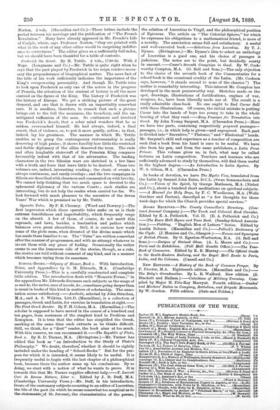ScnooL-Boons.—Odyssey of Homer, Book x. With Introduction, Notes, and Appendices
by G. M. Edwards, M.A. (Cambridge University Press.)—This is a carefully constructed and complete little edition. The introduction deals with " Homeric Forms ;" in the appendices Mr. Edwards discusses such subjects as the usageof to and 6.v, the metre, uses of moods, &c., sometimes going deeperthan is usual in books of this kind in matters of scholarship. The anno- tation seems satisfactory.—Analecta, selected by John Strachan, M.A., and A. S. Wilkins, Litt.D. (Macmillan), is a collection of passages, Greek and Latin, for exercise in translation at sight.— The First Greek Reader. By F. H. Colson, M.A. (Macmillan )—The scholar is supposed to have moved in the course of a hundred and ten pages, from sentences of the simplest kind to Prodicus and Xenophon. It is true that the editor has simplified the Greek, marking at the same time such extracts as he thinks difficult. Still, we think, for a "first" reader, the book aims at too much. With this reserve, we can recommend it.—The Republic of Plato, Book x. By B. D. Turner, M.A. (Rivingtons.)—Mr. Turner has edited this book as " an Introduction to the Study of Plato's Philosophy." We doubt, therefore., whether it should be rightly included under the heading of " School-Books." But for the pur- pose for which it is intended, it seems likely to be useful. It is frequently useful to begin with the last chapter of a philosophical book, because there the author sums up his conclusions. By so doing, we start with a notion of what he wants to prove. It is towards this that Mr. Turner supplies efficient help.—T. Lucreti Cari de Berton Nato/to, Liber v. Edited by J. D. Duff, M.A. (Cambridge University Press.)—Mr. Duff, in his introduction, treats of the customary subjects occurring to an editor of Lucretius, the life of the poet (in which he seems somewhat too sceptical as to the statements,lof St. Jerome), the characteristics of the poems,
the relation of Lucretius to Virgil, and the philosophical position of Epicurus. The article on " The Celestial Sphere," for which he expresses his obligations to a mathematical friend, is more of a novelty. The annotation seems full and satisfactory. A. useful and well-executed book.—Selections from Lucretius. By T. J. Dymes. (Rivingtons.)—Mr. Dymes's idea to select an anthology of Lucretius is a good one, and his choice of passages is judicious. The notes are to the point, but decidedly scanty in amount.—Ccesar's Seventh Campaign in Gaul. By W. Cook- worthy Compton, M.A. (G. Bell and Sons.)—The only objection to the choice of the seventh book of the Commentaries for a school-book is the occasional crudity of the Latin. (Mr. Cookson says, however, "it stands second to none of the classics.") The matter is remarkably interesting. This interest Mr. Compton has developed in the most praiseworthy way. Sketches made on the spot, drawings, illustrations of fortifications, engines of war, weapons, &c., have been liberally made use of. The result is a really admirable class-book. No one ought to find Cesar dull with these illustrations. Of course, the initial mistake is putting CEesar into the hands of boys too young to take in the whole bearing of what they read.—Basy Passages for Translation into Greek. By John Young Sargent, M.A. (Clarendon Press.)—Here we have two parts, containing respectively prepared passages— passages, i.e., in which help is given—and unprepared. Each part is divided into "Narrative," "Platonic," and " Rhetorical" heads. Mr. Sargent's skill and experience as a teacher of composition are such that a book from his hand is sure to be useful. We have also from his pen, and from the same publishers, a Latin Prose Primer. This volume gives us, in fact, what may be called lectures on Latin composition. Teachers and learners who are sufficiently advanced to study by themselves, will find them useful in the highest degree.—An Introduction to Latin Syntax. By W. S. Gilson, M.A. (Clarendon Press.) In books of devotion, we have The Mystic Vine, translated from the Latin by Samuel John Eales, D.C.L. (Swan Sonnensohein and Co.)—Voices of the Spirit, by George Matheson, M.A. (Nisbet and Co.), about a hundred short meditations on spiritual subjects. —A Manual for Holy Days, by F. C. Woodhouse, M.A. (Wells Gardner and Darton), described as "a few thoughts for those week-days for which the Churcir provides special services."


































 Previous page
Previous page